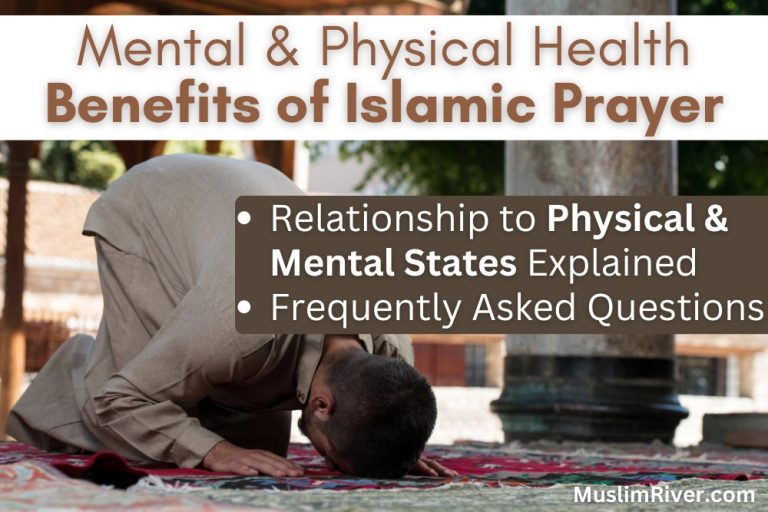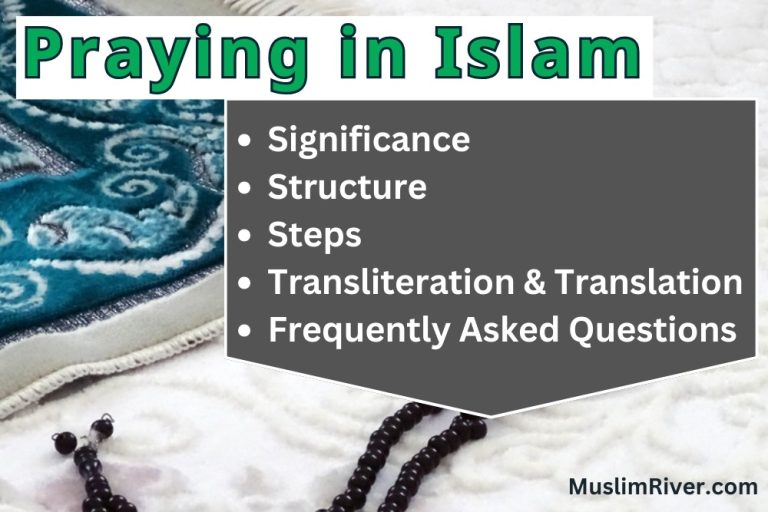Can You Pray in English in Islam?
Are you a new Muslim feeling overwhelmed by all the unknowns of your newfound faith, especially concerning prayer? Maybe you want to understand if praying in English is allowed in Islam.
The use of English for prayer in Islam depends on the context and situation. Generally speaking, it is preferable to recite prayers in Arabic as the Quran was revealed in Arabic, and the Transliteration of Arabic is to help you read the prayer, along with reading the Translation in your language.
I will give you some tips on how to still read in Arabic even if it’s not your first language using Transliteration and the importance of Arabic & reading its meaning.

Quran’s Language
The Quran was revealed in Arabic, so it is highly recommended to recite the Quran and pray Salah (prayer) in Arabic.
Transliteration
To ease understanding of the Quran and prayer for non-Arabic speakers, some scholars have suggested using transliterated versions of the Quranic text or prayers.
Transliterating involves writing out words phonetically without changing their meanings. This approach can help those who cannot understand Arabic but still want to recite the Quran or pray in Arabic.
For Example, you can listen to the pronunciation of the surah Fatiah here at https://quran.com/1. Click on the play button mentioned above the surah.
From Quran (Al-Fatiah):
بِسْمِ ٱللَّهِ ٱلرَّحْمَـٰنِ ٱلرَّحِيمِ
Bismi Allahi arrahmani arraheem
ٱلْحَمْدُ لِلَّهِ رَبِّ ٱلْعَـٰلَمِينَ
Alhamdu lillahi rabbi alAAalameen
٢ ٱلرَّحْمَـٰنِ ٱلرَّحِيمِ
Arrahmani arraheem
مَـٰلِكِ يَوْمِ ٱلدِّينِ
Maliki yawmi addeen
٤ إِيَّاكَ نَعْبُدُ وَإِيَّاكَ نَسْتَعِينُ
Iyyaka naAAbudu wa-iyyaka nastaAAeen
٥ ٱهْدِنَا ٱلصِّرَٰطَ ٱلْمُسْتَقِيمَ ٦
Ihdina assirata almustaqeem
صِرَٰطَ ٱلَّذِينَ أَنْعَمْتَ عَلَيْهِمْ غَيْرِ ٱلْمَغْضُوبِ عَلَيْهِمْ وَلَا ٱلضَّآلِّينَ ٧
Sirata allatheena anAAamta AAalayhim ghayri almaghdoobi AAalayhim wala addalleen
[Al-Fatiah] Source: https://quran.com/1?startingVerse=1&translations=131%2C57
Translation
Muslims can recite and understand the Quran in other languages. There are many translations of the Quran available in multiple languages for this purpose, but ultimately these translations do not replace praying in Arabic.
Translating the Quran does not make praying in a language other than Arabic permissible since the original Quran is revealed in Arabic.
For Example, for the translation of the surah Fatiah is:
بِسْمِ ٱللَّهِ ٱلرَّحْمَـٰنِ ٱلرَّحِيمِ ١
In the Name of Allah, the Most Merciful, the Most Compassionate.
ٱلْحَمْدُ لِلَّهِ رَبِّ ٱلْعَـٰلَمِينَ٢
[All] praise is [due] to Allah, Lord of the worlds
ٱلرَّحْمَـٰنِ ٱلرَّحِيمِ
The Most Merciful, the Most Compassionate
مَـٰلِكِ يَوْمِ ٱلدِّينِ
Sovereign of the Day of Recompense
٤ إِيَّاكَ نَعْبُدُ وَإِيَّاكَ نَسْتَعِينُ
It is You we worship and You we ask for help.
٥ ٱهْدِنَا ٱلصِّرَٰطَ ٱلْمُسْتَقِيمَ
Guide us to the straight path.
صِرَٰطَ ٱلَّذِينَ أَنْعَمْتَ عَلَيْهِمْ غَيْرِ ٱلْمَغْضُوبِ عَلَيْهِمْ وَلَا ٱلضَّآلِّينَ ٧
The path of those upon whom You have bestowed favor, not of those who have evoked [Your] anger or of those who are astray.
[Al-Fatiah] Source: https://quran.com/1?startingVerse=1&translations=131%2C57
5 Tips to Learn How to Pray in the Arabic Language
Indeed, starting a new faith journey can be an overwhelming experience, especially concerning prayer. Here are some thoughts that might help:
1. Take it Step by Step
Learning the ins and outs of prayer can be intimidating initially, but remember that every Muslim was once a beginner. Take your time and break down the learning process into manageable steps.
Start by learning the basics, such as the number of daily prayers and the movements involved, then gradually build upon that foundation.
2. Seek Guidance From Knowledgeable Individuals
Be bold and seek advice from those more experienced in the faith. Contact local mosques, Islamic centers, or Muslim community groups to find mentors or study circles. You can also seek guidance from online resources or contact Muslim scholars or leaders through social media.
3. Stay connected With Your Faith Community
Surrounding yourself with other Muslims can help you feel more grounded in your faith and offer you a support system. Attend congregational prayers, if possible, and try to participate in community events or gatherings. You can also connect with other Muslims through online forums or social media groups.
4. Embrace the Spiritual Aspect of Prayer
Remember that prayer is not just a physical but also a spiritual one. Take time to reflect on the meaning of the prayers and what they represent. Focus on developing a personal connection with Allah (SWT) through your prayers and seek to deepen your faith.
5. Be Patient and Kind to Yourself
Learning to pray can take time, so be considerate as you go through the process. Remember that the most important thing is to have a sincere intention and to do your best. Practice and dedication will make you more comfortable and confident in your prayer practice.
Every journey is unique, and making mistakes or asking questions is okay. Trust in Allah (SWT) and have faith in the process.
Why Pray in Arabic if You Could Pray in Your Native Language?
Praying in Arabic is a form of respect and reverence for Allah’s words, as revealed in the Quran. It is also a connection to the Prophet Muhammad and his teachings.
By praying in Arabic, Muslims demonstrate their commitment and dedication to following his example.
Quran and Hadith that Support Praying in the English Language
Although it is highly recommended to pray in Arabic, some Hadiths suggest that it is permissible for Muslims to pray in any language they know.
For example, It was narrated that Abu Hurairah said:
It was narrated that Abu Hurairah said: “The Messenger of Allah (ﷺ) prayed one day then left and said: ‘0 so-and-so, why don’t you improve your prayer? Shouldn’t the one who is praying reflection how he prays it for himself? I can see behind me just as I can see in front of me.”‘
[Sunan an-Nasa’i 872] Source: https://sunnah.com/nasai:872(Source)
The Al-Tabaraani narrates it in al-Awsat that Abu Hurayrah noted. It is stated by the Messenger of Allah (peace and blessings of Allah be upon him) “I am an Arab, and the Qur”aan is Arabic, and the language of the people of Paradise is Arabic.”(Source)
Sources of Evidence in Support of Praying in English
In addition to the Hadiths, there is also evidence from early Islamic scholars that suggests it is permissible to pray in any language. For example, Imam Abu Hanifa and Imam Malik believed that praying in tongues other than Arabic was acceptable under certain circumstances.
Frequently Asked Questions
Is it Permissible for a Muslim to Recite Qur’an in a Language Other Than Arabic?
Reciting the Quran in any language is acceptable if one understands its meaning. However, repeating the Quran or praying in Arabic is highly recommended since the original revelation was revealed in Arabic.
Do I Need to Be Able to Read Arabic?
No, it is not necessary to be able to read Arabic to recite the Quran or pray. Transliteration can help those unable to understand Arabic but still want to repeat the Quran and prayer in Arabic.
Conclusion
In conclusion, although it is highly recommended to pray in Arabic, it is permissible for Muslims to recite the Quran or pray in any language they know. Both Hadiths and evidence from early Islamic scholars support this.
Ultimately, the choice to pray in Arabic or any other language lies with individual Muslims and should be based on their understanding of Islam and its teachings.






